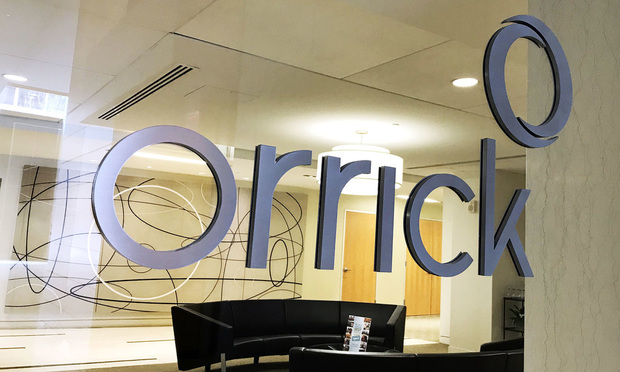Oracle, Suing US Labor Dept., Accuses Agency Enforcer of 'Power Grab'
The complaint, filed by a team from Orrick, Herrington & Sutcliffe, raised a constitutional challenge to the Labor Department's Office of Federal Contract Compliance Programs. The office in 2017 sued Oracle over alleged discriminatory hiring and compensation practices.
November 27, 2019 at 09:47 AM
4 minute read
 Orrick, Herrington & Sutcliffe's office in Washington, D.C./photo by Diego Radzinschi
Orrick, Herrington & Sutcliffe's office in Washington, D.C./photo by Diego Radzinschi
Oracle America Inc. on Wednesday sued the U.S. Labor Department in Washington federal court, urging a judge to curtail the power of an agency enforcer to investigate and prosecute workplace bias claims as the technology company wages a long and bitter fight to thwart Obama-era allegations of workplace bias.
The complaint, filed by a team from Orrick, Herrington & Sutcliffe, raised a constitutional challenge to the Labor Department's Office of Federal Contract Compliance Programs, or OFCCP, the component that investigates and can punish contractors found in violation of federal anti-discrimination protections. The compliance office in January 2017 sued Oracle for alleged pay bias, and that case is pending at the Labor Department.
"The OFCCP has subjected Oracle to administrative proceedings that are unauthorized and impermissible, in violation of the law, and separation of powers," Orrick lawyers Andrew Silverman and Robbie Manhas said in the complaint. The suit confronts the Labor Department's creation of "an administrative trial system wherein agency officials prosecute and adjudicate discrimination claims against government contractors and then award broad injunctive and compensatory relief if the agency finds violations."
A representative for the Labor Department was not immediately reached for comment Wednesday.
The Obama-era Labor Department accused Oracle of broad discrimination against female, African American and Asian employees. The case alleged compensation, recruiting and hiring discrimination. In an amended complaint, labor enforcers said the alleged bias cost women and minority workers $400 million in lost wages.
"Oracle's suppression of pay for its non-white, non-male employees is so extreme that it persists and gets worse over long careers," the Labor Department alleged. "Female, black and Asian employees with years of experience are paid as much as 25 percent less than their peers."
Oracle has denied the government's claims, asserting the company is "in compliance with our regulatory obligations, committed to equality and proud of our employees."
Adverse findings against government contractors could threaten current and future federal government contracts. Many cases against big companies settle, sometimes for millions of dollars. OFCCP said last month that fiscal year 2019 was "by far its most successful year in both enforcement and compliance assistance." The office said it had obtained a record $40.5 million in monetary settlements for affected class members.
"Through a combination of effective enforcement and proactive compliance assistance, OFCCP has made a major impact on ensuring equal employment opportunity for America's workforce, and will continue to do so in the upcoming year," Craig Leen, the director of OFCCP, said in a statement last month.
Oracle's suit said OFCCP in 1977 "radically departed from its previous understanding of its power. Without authority, the OFCCP transformed itself into a super-EEOC by giving itself power that exceeds what Congress granted to the EEOC." The complaint alleged a "power grab" remains in place today.
In its complaint, Oracle took steps to portray the company as broadly supportive of anti-discrimination laws. Other technology companies fighting claims of workplace bias have made similar assertions in court papers.
"Oracle recognizes that lawful, constitutional prosecution and adjudication of employment claims against employers, including government contractors, can play an important role in promoting equal employment and ending employment discrimination, in all forms," Oracle's lawyers said in their lawsuit. "Oracle opposes discrimination, which has no place in employment or anywhere else. The issue here is the place and manner in which claims of discrimination and affirmative-action violations are prosecuted and adjudicated. Those claims must be pursued fairly and constitutionally."
In 2017, a Trump administration proposal would have disbanded the Labor Department's contract compliance enforcer and merged it with the U.S. Equal Employment Opportunity Commission. That move, according to the Trump administration, would "reduce operational redundancies, promote efficiencies, improve services to citizens, and strengthen civil rights enforcement."
Oracle's complaint is posted below:
Read more:
Government Warns Law Firms of Consequences for Diversity Failures
Oracle Judge Urges: 'Stop With the Invective' Emails and Pick Up the Phone
Why the US Labor Dept. Is Dropping Its Google Pay-Data Appeal
US Labor Judge Warns Lawyers About 'Tone' in Oracle Discrimination Case
This content has been archived. It is available through our partners, LexisNexis® and Bloomberg Law.
To view this content, please continue to their sites.
Not a Lexis Subscriber?
Subscribe Now
Not a Bloomberg Law Subscriber?
Subscribe Now
NOT FOR REPRINT
© 2025 ALM Global, LLC, All Rights Reserved. Request academic re-use from www.copyright.com. All other uses, submit a request to [email protected]. For more information visit Asset & Logo Licensing.
You Might Like
View All
Skadden and Steptoe, Defending Amex GBT, Blasts Biden DOJ's Antitrust Lawsuit Over Merger Proposal
4 minute read
'Lack of Independence' or 'Tethered to the Law'? Witnesses Speak on Bondi
4 minute read
Law Firms Mentioned
Trending Stories
Who Got The Work
J. Brugh Lower of Gibbons has entered an appearance for industrial equipment supplier Devco Corporation in a pending trademark infringement lawsuit. The suit, accusing the defendant of selling knock-off Graco products, was filed Dec. 18 in New Jersey District Court by Rivkin Radler on behalf of Graco Inc. and Graco Minnesota. The case, assigned to U.S. District Judge Zahid N. Quraishi, is 3:24-cv-11294, Graco Inc. et al v. Devco Corporation.
Who Got The Work
Rebecca Maller-Stein and Kent A. Yalowitz of Arnold & Porter Kaye Scholer have entered their appearances for Hanaco Venture Capital and its executives, Lior Prosor and David Frankel, in a pending securities lawsuit. The action, filed on Dec. 24 in New York Southern District Court by Zell, Aron & Co. on behalf of Goldeneye Advisors, accuses the defendants of negligently and fraudulently managing the plaintiff's $1 million investment. The case, assigned to U.S. District Judge Vernon S. Broderick, is 1:24-cv-09918, Goldeneye Advisors, LLC v. Hanaco Venture Capital, Ltd. et al.
Who Got The Work
Attorneys from A&O Shearman has stepped in as defense counsel for Toronto-Dominion Bank and other defendants in a pending securities class action. The suit, filed Dec. 11 in New York Southern District Court by Bleichmar Fonti & Auld, accuses the defendants of concealing the bank's 'pervasive' deficiencies in regards to its compliance with the Bank Secrecy Act and the quality of its anti-money laundering controls. The case, assigned to U.S. District Judge Arun Subramanian, is 1:24-cv-09445, Gonzalez v. The Toronto-Dominion Bank et al.
Who Got The Work
Crown Castle International, a Pennsylvania company providing shared communications infrastructure, has turned to Luke D. Wolf of Gordon Rees Scully Mansukhani to fend off a pending breach-of-contract lawsuit. The court action, filed Nov. 25 in Michigan Eastern District Court by Hooper Hathaway PC on behalf of The Town Residences LLC, accuses Crown Castle of failing to transfer approximately $30,000 in utility payments from T-Mobile in breach of a roof-top lease and assignment agreement. The case, assigned to U.S. District Judge Susan K. Declercq, is 2:24-cv-13131, The Town Residences LLC v. T-Mobile US, Inc. et al.
Who Got The Work
Wilfred P. Coronato and Daniel M. Schwartz of McCarter & English have stepped in as defense counsel to Electrolux Home Products Inc. in a pending product liability lawsuit. The court action, filed Nov. 26 in New York Eastern District Court by Poulos Lopiccolo PC and Nagel Rice LLP on behalf of David Stern, alleges that the defendant's refrigerators’ drawers and shelving repeatedly break and fall apart within months after purchase. The case, assigned to U.S. District Judge Joan M. Azrack, is 2:24-cv-08204, Stern v. Electrolux Home Products, Inc.
Featured Firms
Law Offices of Gary Martin Hays & Associates, P.C.
(470) 294-1674
Law Offices of Mark E. Salomone
(857) 444-6468
Smith & Hassler
(713) 739-1250











